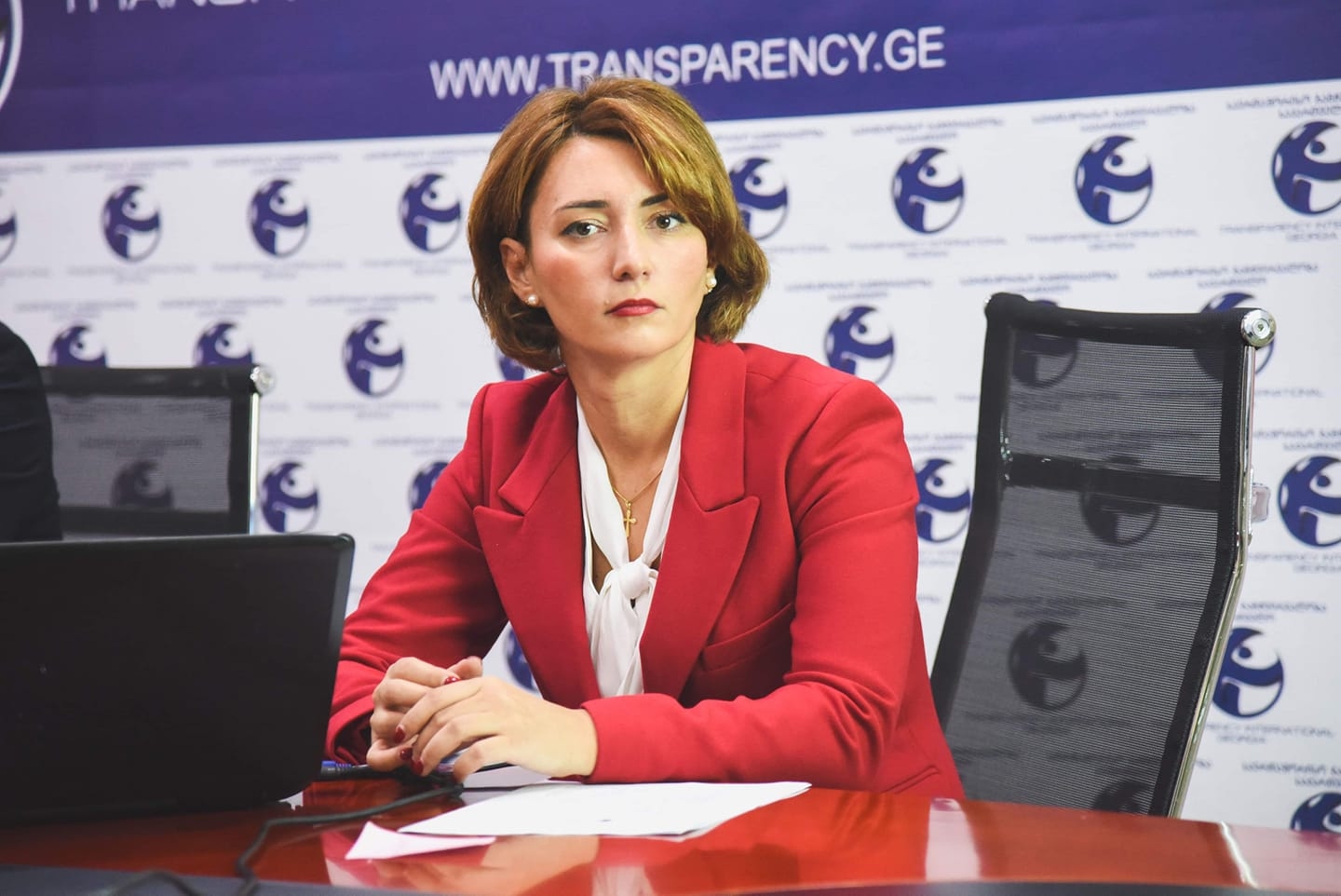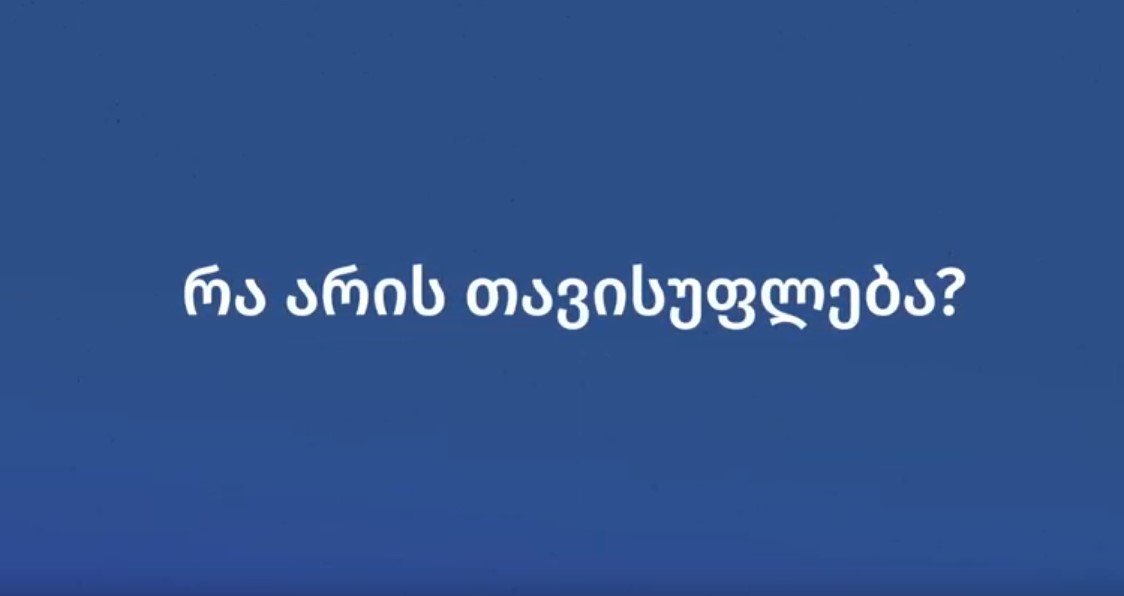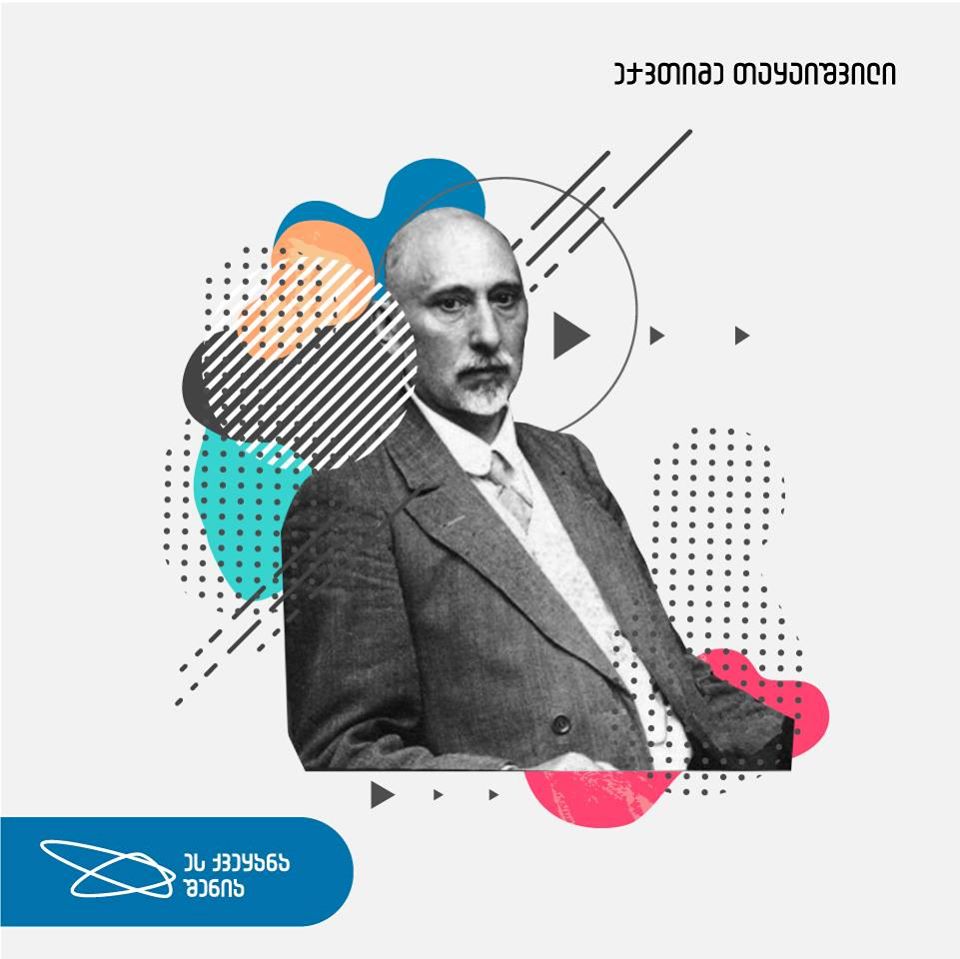Changes within the sector from elections until today ...
Popular





What are the developments within the civil sector, what has changed from the elections until today and what is the sector expecting? We interviewed about these topics the Executive Director of "Transparency International – Georgia" Eka Gigauri.
Interviewed by Lali Shalvashvili.
What are the achievements of CSOs and what should they still achieve? Let's start with pros and cons of the sector...
Eka Gigauri – This is a rather difficult question. We always talk about pros and cons, and I believe one of the huge problems of CSOs is their dependence on grants. On one hand it is great to have a grant and project, or to research something, but on the other hand it is necessary to react to some urgent issues. One may face a problem, as the activities implemented as part of the grant may not be a priority at all during that moment, and a totally different issue may be relevant. And all of this is linked to the allocation of extra time and human resources.
You mean that the priorities of some specific project may not meet the demands of the time?
Eka Gigauri – Of course. For instance, we have the three-year project and the events planned three years ago may not be relevant at all, even after one year. And especially in Georgia, where the situation changes very often and accordingly it is extremely difficult to predict what will be important. Predicting the effective advocacy campaign several years ahead is not an easy task as well. Yet, this is not problematic for our organization in view of its funding structure and human resources. Apart from the project activities, we have the capacity to engage in other affairs. Exactly half of our activities relates to civil activities that may not be covered by any project. We implement many new and interesting initiatives on volunteering bases. Pursuing activities beyond projects is somewhat difficult for comparatively smaller organizations.
What is the way out? We all know that the international donor organizations are almost single source of funding of the NGO sector...
Eka Gigauri – I believe way out is that every single person must acknowledge we are the citizens of this country and should participate in the civil activities. In addition to our own business, all of us – myself, you, others, business representatives must be interested in solution of various problems, such as landscaping, cleaning or other problems. Georgian society should care about empowering the groups of such activists. I say this because donations or contributions from business or citizens to NGOs are extremely rare.
Disorganized cooperation with business is named as one of the drawbacks of NGO activities, but it is said to be a two-sided problem...
Eka Gigauri – Business could not build such relations with the sector either. Until today this was triggered by the political environment as well, for example we are the critical NGO and therefore they would not be eager to cooperate with us. Some people have told us about this directly. Further, I think they do not acknowledge that they can do something for the district and community where they live, be it the environmental protection or something else. This may not be their interest at all, but these issues affect the public life. I reckon the way out lies in an information campaign, through which we inform everyone to take care of local problems together.
We had a meeting with business representatives, met with the representatives of associations and wished to achieve certain cooperation - for instance raise the issue of business accountability - but they did not express any interest.
We discussed international organizations and funding sources. Is the NGO sector ready to offer the proposals and topics to international organizations so that the project activities do not lose relevance?
Eka Gigauri – Our funding gives us, let's say "flexibility", because the management and financial structure is set in accordance with international standards. However, it is not like this in every organization. Hence, I believe the donors should revise their strategy. If they want strong organizations to become stronger that is fine, but if they want small organizations working on the local community problems to be empowered, they should think about revising the policy. This may involve more risks for them, but it is life a certain vicious circle - in order for the businessmen and citizens to donate, NGOs should demonstrate that they have achieved the objective and discuss issues that are of everyday concern to the population. Such issues may be related to water supply, road renovation or cleaning from waste. It is very important that groups are available on the spot to work on local problems. They require funding for this. When business or a citizen sees that they have solved something, they will support and promote their activities. Therefore, I believe the donors will change the strategy in this respect.
I think the organizations operating in the region know the local problems better than, for example, me. This is their advantage. They may not draft the grant proposal in accordance with the requirements and the work and trainings have to be delivered in this respect, but it is a fact that they are better aware of local problems.
What kind of impact does the civil sector have on the society? According to the surveys published in recent years, the awareness of the sector is modest...
Eka Gigauri – If someone says that during the pre-election period the civil sector was weak, I would really disagree, as we have achieved a lot before the elections.
Do you mean the whole sector?
Eka Gigauri – We can say we felt and exercised influence on certain decisions and developments. We all saw this who cooperated among each other. The sector is weak to a certain extent, but there is readiness to involve the civil sector in everything.
However, the attempts to involve the sector were there after 2003, at the initial stage of the newcomer authorities...
Eka Gigauri – That is correct indeed. Now I do not know and cannot say it will remain like this, but our activities really influence certain processes. As for the trust, even the agenda of our organization includes issues that are not everyday problems for the population. We always try to do the work that concerns the population. Election legislation, let's say, is important, but the insurance policy is even more important for the population. That's why we have free of charge consultation centers and work on insurance issues as well. In my opinion, the civil sector enjoys growing trust every time when the trust towards political parties diminishes, i.e. when the population does not know who to listen to and wants to learn the expert opinions. In general, trust is also subjective.
Civil sector is a certain tool for every member of the society for bringing his/her voice or opinion to the authorities. Do the population use this mechanism and if not, is the lack of information the reason for this?
Eka Gigauri – The population do not use this tool because they think this path will not lead to nowhere. Generally, our citizens are passive. Probably because they have other concerns – I mean the social background. If one asks a citizen what can be done to increase the level of employment, the response is that nothing can help. There is a general attitude among the public that a certain political force will come and solve everything. Such expectation is wrong, citizens should be actively involved in everything, one man cannot change anything.
What is the role of NGOs in this regard?
Eka Gigauri – Over years we try to form the group of activists that will work on local problems on volunteering bases. We assist in terms of dissemination of information and informing the authorities, but we could not mobilize this people, as doing something for free is still a problem. They think they should be paid for solving the local problems. The experience of western states shows that donors do not fund the NGO sector, these are self-organized groups fighting for some objective, which is very good.
Although a short period of time has lapsed after the elections and there is no time for full-fledge analysis, still, what has changed in the sector at a glance?
Eka Gigauri – Many things have changed. The objective before the elections was to hold democratic elections and people to enjoy the right of a free choice. Situation was grave in terms of human rights also. The attitude within the NGO sector was that their ideas were ignored, the government was closed, etc. Owing to this, we were mobilized to hold democratic elections. Obviously, the situation after the elections has changed and now everyone acts and thinks differently. In the opinion of some, more time should be given to the government for it to do something, and they believe criticizing is not reasonable. Another part thinks a sound critique is necessary from the beginning in order to avoid the same mistakes. This kind of diversification has occurred within the sector. In addition, some have moved from the sector to work on the government. I think the sector will arrange gradually and find its role. Now we have a bit messy situation.
You noted that the sector should find its role. What do you mean? And as you mentioned different opinions, is it better not to criticize the authorities today or to the contrary, sound critique is better?
Eka Gigauri – I believe criticizing is better and our activities attest to this. They need constructive criticism just now. We understand that a short amount of time has lapsed after a new team has arrived in power, but we should not make the mistakes that will be difficult to fix in the future. Accordingly, we find that after the elections we should continue acting just like prior to the elections. As for the role, I meant exactly the monitoring, reference to the problems and a constructive critique. And another issue has also shown itself – after the government has expressed the desire to involve the civil sector, the latter must comprehend its responsibility over the issues, on which it recommends to the government, and identify the ways for their implementation. In several cases the sector may face problems.
Why?
Eka Gigauri – Because when the recommendations are transformed into a draft bill, it may turn out I was wrong and the recommendation may not work. One needs more expertise in specific issues, and should work on a policy and plan that the authorities must implement.
But even for recommendations, wasn't the NGO sector always responsible for them?
Eka Gigauri – Of course. Our organization did not have this problem either at the time or now, we do not lack the expertise either and really tried and try to discuss concrete issues.
After 2003, the authorities at the time have offered NGO sector to cooperate and have invited it to various councils. What differences or similarities do you see?
Eka Gigauri – I cannot say anything about others and will mention the example of our organization. We always - back then and now - were a part of an anti-corruption council. Previously our presence was nominal, it seems for some to say that we were included in the council – we were unable either to lobby the positions or be involved in defining the strategy. We were given the strategy paper few days before the meeting, and we could not either examine it or even read it. This was a nominal involvement apparently. Now the situation is different – we are fully involved in the process and are the co-participants. I do not know about future cooperation, but the difference is that now partnership is not formal.
Certain NGOs were affiliated with the previous authorities. Is the same danger there now?
Eka Gigauri – Such a danger is always there. When I mentioned in the beginning about the sector finding its role, that was what I meant. The civil sector faces this challenge – a co-fighter from yesterday may become a high official. As already mentioned, one part believes there is no time for critique now – everyone have their own choice.
NGOs that prefer waiting, are they strong organizations? Is their influence on the public substantial?
Eka Gigauri – In our sector the organizations' employees personally are more well-known than the organizations themselves. When I talked about loyalty, I meant persons who have moved from the sector to the government now. I don't think prominent organizations would have to face this issue.
Political events have a certain impact on the activities of international organizations. In which direction can they change or revise the policies towards NGOs?
Eka Gigauri – They may revise the areas (directions). One trend that is identifiable is that the former state officials, deputy ministers or other officials have established NGOs and they gradually occupy a certain niche. Frankly speaking, there are many respectable persons among them who were not a part of unlawfulness and who did a good job for the country. Yet, among them are the former employees of agencies that raise too many questions. On one hand, their experience and knowledge is great – at least in terms of reforms, we do not possess as much information as they do. On the other hand, the values are at stake. I meant persons who had to deal with human rights issues, could affect certain issues but did not do it, and now plan to do this from NGO sector. This is hard to understand. They may have good results even, but I think they will have difficulties in doing this work.
When such questions arise, will you be able to cooperate with them at least over concrete issues?
Eka Gigauri – Sure. If they join the statement concerning, for instance, illegal dismissal from work or violation of other rights, why not. We said this earlier and say now as well that the more signatories our initiatives or statements have, the better.
Let's go back to international organizations, in which direction can their programs change?
Eka Gigauri – I believe they will work more on social problems. This area should be emphasized more. I do not say that the justice reform for example is less important – we have a rapid progress in this respect – this is mostly owed to the donors and these issues are equally important.However, it's a fact that the social background must change.
How would you rate the activities of NGOs on the 10-point scale?
Eka Gigauri – By 5 points as a sum total. Organizations are stronger in the large cities and I would give them 7 points separately, and 2-3 points in the boroughs and rural areas.
What are the three values that the civil sector must be built on?
Eka Gigauri – Impartialness, civil activity, i.e. the volunteer spirit and statehood thinking and the protection of national interests.
In some cases statehood thinking means non-disclosure of certain information. What did you imply by it?
Eka Gigauri – State interest is the democracy, transparency, accountability, etc. Truth and democratic principles are the very state interest.








